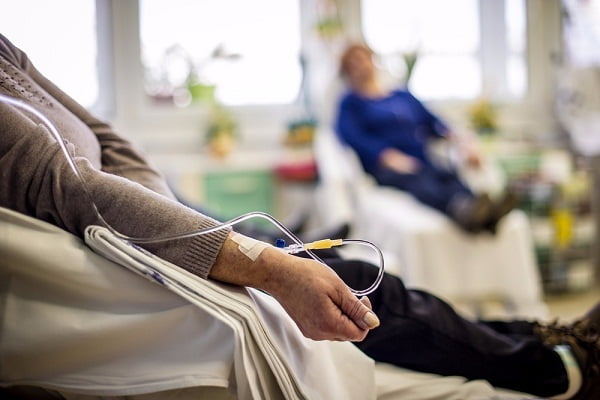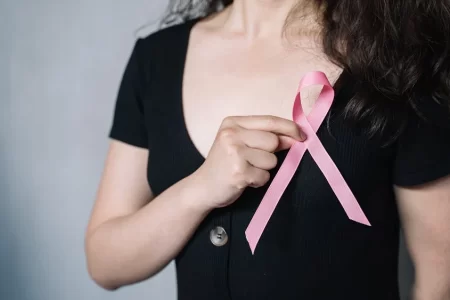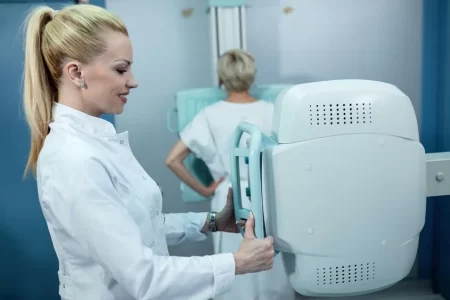What You Should Know About Chemotherapy for Cancer
- Updated on: Jul 8, 2024
- 6 min Read
- Published on Apr 21, 2021

Definition and meaning of chemotherapy
Chemotherapy is a widely used well established treatment for cancer. The term ‘chemotherapy’ refers to the drugs that prevent cancer cells from dividing and growing. It works by killing the cells that divide in an uncontrolled way.
Quick facts on chemotherapy
- Chemotherapy is used in the treatment of cancer
- It is used as a primary treatment to destroy cancer cells
- Chemotherapy is sometimes used to relieve symptoms of advanced cancer
- Chemotherapy can be used along with other treatment options to shrink a tumor
- It can prevent disease progression or cause remission by killing the cells that divide
- Although the objective of chemotherapy is to target cancer cells, but it may also damage healthy cells and cause side effects
- The types of medication used in chemotherapy depend on a patient’s condition, the type of cancer, and the goal of cancer therapy
- Chemotherapy is sometimes used to treat diseases other than cancers
- Depending on the type of cancer and the condition of the patient, chemotherapy drugs may be administered orally or intravenously
What is chemotherapy?
New cells continuously replace old cells in our body as part of the natural process. This process of dividing and growing cells sometimes become uncontrolled leading to cancer. In cancers, cells reproduce and grows in an uncontrolled meaner.
As more and more cells are produced, they start to occupy more spaces until they start filling the spaces of previously existing healthy cells.
Chemotherapy is a treatment procedure that is mostly used in cancers to interfere with the growth of these cells and their ability to divide and reproduce.
Your doctors will decide which drugs to use in chemotherapy procedure based on your condition and the cancer type. They may use one drug or a combination of chemotherapy drugs.
How is chemotherapy used to treat cancer?
Unlike surgery and radiation therapy that remove or kill or damage cancer cells in a certain target area, chemotherapy drugs (chemo drugs) can work for the entire body. Therefore, chemo drugs can kill the cancer cells that have spread (metastasized) to other parts of the body including distant sites from the original (primary) tumor.
See also: Adrenal Cancer And Adrenal Tumors: Causes, Signs, Symptoms, Diagnosis, Prevention, Treatment, Stages
See also: Metastatic Bone Cancer: What Is Bone Metastasis? Causes, Symptoms, Diagnosis, Treatment
Goals of chemotherapy treatment
There are three main objectives for chemotherapy (chemo) in cancer treatment. These are:
- Cure the cancer
- Control the cancer growth
- Palliation therapy
Curing The Cancer With Chemotherapy
Your doctor will see if it is possible to treat cancer completely and cure the disease with chemo drugs. In such cases, the cancer is destroyed completely. It goes away and doesn’t come back. However, no one knows whether the cancer will come back or not. It’s only a possibility or the intention to cure the cancer.
Though cure may be the goal of chemotherapy in cancer treatment, it doesn’t always happen. Sometimes, cancer comes back even after many years of the successful treatment. It takes many years to know if the cancer will come back or not.
Controlling The Disease
If cure of the cancer is not possible, your doctor will try to control the disease. Chemo drugs can be used to shrink tumors and/or stop the cancer from growing and spreading from the original site. This can help the person live longer and improve the overall quality of life.
The cancer may not completely go away, but is controlled and managed like any other chronic disease such as a heart disease, kidney disease, or diabetes. Sometimes, you may see that the cancer is gone but it is likely to come back after some time. Chemo drugs can be given again if it comes back.
Palliative Chemotherapy Or Palliation
Sometimes chemotherapy is used as a palliative care therapy. This is called palliative chemo or palliative chemotherapy or simply palliation.
It is done when the cancer is at an advanced stage. It cannot be cured or controlled and has spread from where it originally started to other parts of the body. The goal may of palliation is to improve the quality of life and make the person feel better. Chemo palliation may be used to shrink a tumor, relieve pain or pressure from a problem-causing tumor, etc.
Preparing for chemotherapy: Planning chemotherapy treatments
You cancer specialist, an oncologist, will decide which drug or combination of drugs you will need. He or she will decide drug/drug combination, dosages, duration of chemotherapy treatment, mode of delivery or injection of the drugs, and how often you’ll need the treatment. These decisions will depend on various parameters such as:
- type of cancer
- stage of the cancer – how advanced it is
- whether the cancer is located in the original site where it started or has metastasized
- location of the cancer
- how big your cancer is
- how does the cancer affect your body functions and overall health
Determining Which Chemotherapy Drugs To Use
Cancer can be treated with a single chemo drug, but several drugs are used in a certain order or in certain combinations in most cases. This is called combination chemotherapy. Several drugs that work in different ways can work together to invade more cancer cells. This helps lower the chance of drug resistance to any particular chemo drug.
Sometimes, it is clear which drug will work better for you. Your doctor can decide about the drugs combination and schedule of chemo treatments. But in some cases, doctors might choose different drug combinations with different schedules if the treatment choices are not very clear.
These factors play an important role in helping your doctor decide about chemotherapy drugs combination:
- Type of your cancer
- Stage of the cancer
- How far it has spread – located to the original site or spread to nearby or distant organs
- Overall health of patient
- Other chronic or serious problems patient might be suffering with such as kidney diseases, liver problems etc
- Any treatments of cancer delivered in the past
- Your age
Determining Chemotherapy Doses
Chemotherapy (chemo) drugs are strong medicines. It is important to plan the dosages carefully as taking too little of a drug will not treat the cancer and taking too much of the drug may cause life-threatening problems.
Chemo doses are therefore calculated very carefully.
There are several ways to calculate chemo drugs doses according to the type of drug. Most chemo drugs are measured in milligrams (mg).
- Some doses are calculated based on a person’s body weight in kilograms
- Some chemo doses are calculated based on body surface area
Dosages for children and adults generally will vary. Children may have different levels of sensitivity to the drugs compared to adults.
- Dosages of chemo drugs may vary based on such as:
- Age
- Blood cells count
- Obesity
- Any other ongoing or completed treatment in the past for cancer such as radiation
- Any chronic disease patient may be suffering with such as a liver or kidney disease
- Your child’s nutritional status
Chemotherapy schedule (cycle)
Chemotherapy is delivered at regular intervals. These intervals are called chemotherapy cycles. A chemotherapy cycle refers to a dose of one or more drugs followed by several days or weeks without chemo treatment. This gives normal cells time to recover from drug side effects. Sometimes, doses may be given for a certain number of days continuously, or every other day for a few days. All this depends on the cancer, condition of the patient, and the drug combinations.
Sometimes, with serious side effects of chemotherapy, your doctor may require adjusting the chemo plan (dose and/or schedule).
See also: Leukemia (blood cells cancer)
See also: Kidney Cancer (Renal Cancer): Causes, Symptoms, Diagnosis, Treatment
How is chemotherapy delivered?
Depending on the type of cancer, a patient may be administered with chemo drugs either orally or intravenously (injected into the vein or somewhere else).
Oral Administration Of Chemotherapy Drugs
If the patient is in good health, he or she may be given tablets to carry at home. But, the patient will still be needed to regularly visit the hospital to evaluate response to the therapy and to observe any potential side effects. The drug may be available in the form of capsules or liquid drops.
The dose must be taken exactly as your doctor specify. If you forget to take even one of the doses at a particular recommended time, you should tell this to the doctor immediately.
Intravenous Chemotherapy
In this mode, chemo drugs may be:
- injected directly into a vein with a needle
- delivered through an intravenous infusion
- given as an injection into a muscle such as in your arm, thigh, or other location in the body
- provided intrathecally – chemo drugs are injected into the space between layers of tissue that cover the brain and spinal cord
- delivered intra-arterially (IA) – chemo drugs are injected into the artery that leads to the cancer
- given through a drip or a pump to ensure a constant rate of delivery
How long does chemotherapy treatment last?
The chemotherapy treatment is delivered regularly over a certain period that will be specified by the cancer specialist.
The treatment course can range from a single dose on one day to a few weeks, depending on the type and stage of the cancer.
Sometimes, you may require more than one course of treatment. You may be asked to rest for a certain period to allow their body to recover.
Treatment could occur on one day, followed by a few weeks rest, then another one-day treatment followed by another few weeks rest, and so on. This may be repeated a few times as determined by the doctor.












